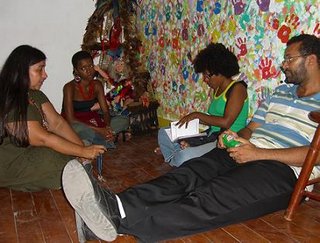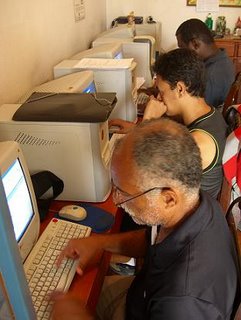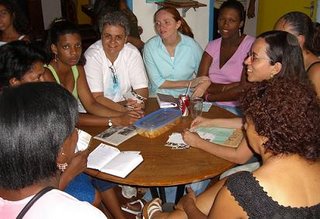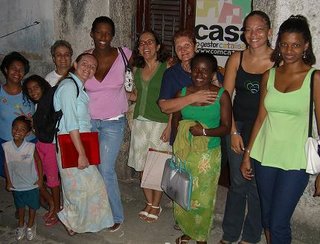Women Leaders at the Casa
Today was a typical day at the Casa, various meetings and activities organized and unorganized, going on simultaneously, delicately interweaving in a fashion that allows local leaders to meet and greet, learn and unlearn. What was interesting today was the strong focus on women's groups and issues...
 Strolling into the Casa's workshop room, I walked by a small group of four -- sitting on the wooden floor -- an unlikely group including Marilia Ferreira (from Terrévida environmental project), Celso Vergne (a local university professor and a specialist in community and NGO psychology), and Jana Guinond (from the NGO Estimativa working to build self-esteem in indigenous and Afro-Brazilian women). The group was discussing next steps with regard to a joint project they are working on, called "Toré": a Sunday festival with indigenous foods, dances, a film screening and debate on indigenous issues, scheduled for May 21st.
Strolling into the Casa's workshop room, I walked by a small group of four -- sitting on the wooden floor -- an unlikely group including Marilia Ferreira (from Terrévida environmental project), Celso Vergne (a local university professor and a specialist in community and NGO psychology), and Jana Guinond (from the NGO Estimativa working to build self-esteem in indigenous and Afro-Brazilian women). The group was discussing next steps with regard to a joint project they are working on, called "Toré": a Sunday festival with indigenous foods, dances, a film screening and debate on indigenous issues, scheduled for May 21st.
 Further into the Casa, I joined leaders in the computer center, now rebuilt thanks to a generous donation from a local businessman. One of them -- Deley -- has just posted his latest community program - Cirlanda - to Catalytic Communities' website. The Cirlanda project, not yet translated to English, was named after a woman in the community of Acari who ran youth programs only to be shot in the stomach by local police in 1998. Today, the Cirlanda project works to fulfill her dream. With an increasing number of young women at risk in Acari, Deley and others have developed a series of activities, including sports, specifically to counteract those risks.
Further into the Casa, I joined leaders in the computer center, now rebuilt thanks to a generous donation from a local businessman. One of them -- Deley -- has just posted his latest community program - Cirlanda - to Catalytic Communities' website. The Cirlanda project, not yet translated to English, was named after a woman in the community of Acari who ran youth programs only to be shot in the stomach by local police in 1998. Today, the Cirlanda project works to fulfill her dream. With an increasing number of young women at risk in Acari, Deley and others have developed a series of activities, including sports, specifically to counteract those risks.
 Maria Helena Zamora, who has instructed in a variety of leadership training courses for people from Rio's favelas (squatter communities) organized a meeting of women leaders in the Casa's informal meeting room. These women have just completed a course run by Zamora at the local Catholic University (PUC), a course that upon completion had participants clamoring for more. The course could no longer continue at PUC, so Zamora brought the women to "ComCat" -- as Catalytic Communities is known in Rio -- where they could continue to meet as long as they like, organize future seminars, events, and exchanges. This was the third meeting the group had had at the Casa since completing their course. Many more will follow, with further activities planned...
Maria Helena Zamora, who has instructed in a variety of leadership training courses for people from Rio's favelas (squatter communities) organized a meeting of women leaders in the Casa's informal meeting room. These women have just completed a course run by Zamora at the local Catholic University (PUC), a course that upon completion had participants clamoring for more. The course could no longer continue at PUC, so Zamora brought the women to "ComCat" -- as Catalytic Communities is known in Rio -- where they could continue to meet as long as they like, organize future seminars, events, and exchanges. This was the third meeting the group had had at the Casa since completing their course. Many more will follow, with further activities planned...
 The day ended on a lively note, with Zamora's leaders hanging out in the doorway for quite some time, before heading each in her own direction...
The day ended on a lively note, with Zamora's leaders hanging out in the doorway for quite some time, before heading each in her own direction...
 Strolling into the Casa's workshop room, I walked by a small group of four -- sitting on the wooden floor -- an unlikely group including Marilia Ferreira (from Terrévida environmental project), Celso Vergne (a local university professor and a specialist in community and NGO psychology), and Jana Guinond (from the NGO Estimativa working to build self-esteem in indigenous and Afro-Brazilian women). The group was discussing next steps with regard to a joint project they are working on, called "Toré": a Sunday festival with indigenous foods, dances, a film screening and debate on indigenous issues, scheduled for May 21st.
Strolling into the Casa's workshop room, I walked by a small group of four -- sitting on the wooden floor -- an unlikely group including Marilia Ferreira (from Terrévida environmental project), Celso Vergne (a local university professor and a specialist in community and NGO psychology), and Jana Guinond (from the NGO Estimativa working to build self-esteem in indigenous and Afro-Brazilian women). The group was discussing next steps with regard to a joint project they are working on, called "Toré": a Sunday festival with indigenous foods, dances, a film screening and debate on indigenous issues, scheduled for May 21st. Further into the Casa, I joined leaders in the computer center, now rebuilt thanks to a generous donation from a local businessman. One of them -- Deley -- has just posted his latest community program - Cirlanda - to Catalytic Communities' website. The Cirlanda project, not yet translated to English, was named after a woman in the community of Acari who ran youth programs only to be shot in the stomach by local police in 1998. Today, the Cirlanda project works to fulfill her dream. With an increasing number of young women at risk in Acari, Deley and others have developed a series of activities, including sports, specifically to counteract those risks.
Further into the Casa, I joined leaders in the computer center, now rebuilt thanks to a generous donation from a local businessman. One of them -- Deley -- has just posted his latest community program - Cirlanda - to Catalytic Communities' website. The Cirlanda project, not yet translated to English, was named after a woman in the community of Acari who ran youth programs only to be shot in the stomach by local police in 1998. Today, the Cirlanda project works to fulfill her dream. With an increasing number of young women at risk in Acari, Deley and others have developed a series of activities, including sports, specifically to counteract those risks. Maria Helena Zamora, who has instructed in a variety of leadership training courses for people from Rio's favelas (squatter communities) organized a meeting of women leaders in the Casa's informal meeting room. These women have just completed a course run by Zamora at the local Catholic University (PUC), a course that upon completion had participants clamoring for more. The course could no longer continue at PUC, so Zamora brought the women to "ComCat" -- as Catalytic Communities is known in Rio -- where they could continue to meet as long as they like, organize future seminars, events, and exchanges. This was the third meeting the group had had at the Casa since completing their course. Many more will follow, with further activities planned...
Maria Helena Zamora, who has instructed in a variety of leadership training courses for people from Rio's favelas (squatter communities) organized a meeting of women leaders in the Casa's informal meeting room. These women have just completed a course run by Zamora at the local Catholic University (PUC), a course that upon completion had participants clamoring for more. The course could no longer continue at PUC, so Zamora brought the women to "ComCat" -- as Catalytic Communities is known in Rio -- where they could continue to meet as long as they like, organize future seminars, events, and exchanges. This was the third meeting the group had had at the Casa since completing their course. Many more will follow, with further activities planned... The day ended on a lively note, with Zamora's leaders hanging out in the doorway for quite some time, before heading each in her own direction...
The day ended on a lively note, with Zamora's leaders hanging out in the doorway for quite some time, before heading each in her own direction...

